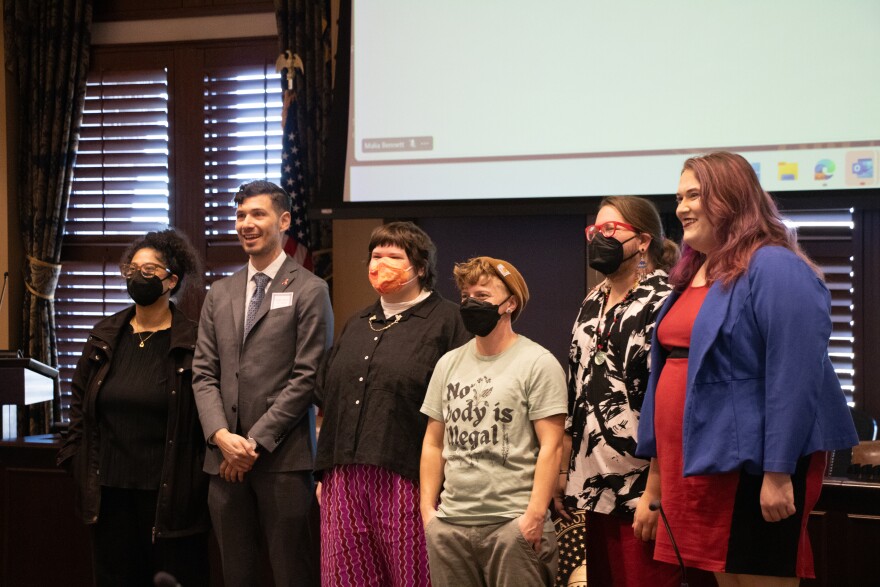Sen. Julia Kirt (D-Oklahoma City) and Sen. Carri Hicks (D-Oklahoma City) invited policy and legal groups to a community interim study Wednesday, highlighting a need to decriminalize HIV through a public health approach.
In Oklahoma, there were 387 newly identified cases of HIV in 2021, and 21.7% of these were between the ages of 13 and 34 – a population that accounts for 58% of new infections nationally. Statewide, 6,940 people are living with HIV or AIDS.
Sean McCormick, a staff attorney with the Center for HIV Law and Policy, highlighted Oklahoma statutes that could apply to HIV:
- HIV-specific exposure offense: It is a felony for a person who is aware of their positive HIV status to engage in conduct that is “reasonably likely” to result in the transfer of the person’s bodily fluids onto another person with “intent to infect another” without their consent or knowledge of the person’s status. McCormick said Oklahoma is one of 32 states with this type of offense, which is punishable by up to five years in prison.
- HIV-specific sex work law: It is a felony for any person to engage in “prostitution” if they’re aware of their positive HIV status. McCormick said Oklahoma is one of 10 states with an offense targeting people living with HIV and engaging in sex work. It is punishable by up to five years in prison.
- Spread of contagious diseases: Every person who “willfully exposes” themselves or others in “any public place or thoroughfare” can be charged with a misdemeanor.
McCormick said the exposure offense doesn’t address transmission, meaning people living with HIV could be incarcerated and sentenced despite not transmitting the virus. He said disclosure can also be difficult to prove.
“A man in Oklahoma was charged with knowingly exposing his girlfriend to HIV. She alleged that she did not know about … the man's status during their relationship,” McCormick said “It was not until six months later that eyewitness testimony proved that, in fact, the woman was aware of the person's status before initiating their sexual relationship.”
The sex work statute criminalizes behaviors posing no risk of transmission because of its definition of prostitution, McCormick said. It includes oral sex – which poses a low risk of HIV transmission – or making an appointment to engage in sex. “That is, people could be prosecuted under this law for merely sending messages online,” McCormick said.
Oklahoma has seen 141 HIV-related charges, with 130 separate arrests, according to data from the Oklahoma State Bureau of Investigation compiled by the Williams Institute, a UCLA Law think tank.
Arrests/Prosecutions
People
Convictions
HIV Exposure
124
115
87
34
Prostitution
17
14
13
0
Both
1
2
Total
141
130
102
34
Nathan Cisneros, the institute’s HIV criminalization project director, said although Oklahoma's exposure law was last updated in the late 90s, there is continued enforcement of such statutes even today. And that enforcement is happening across the state, with concentrations in urban counties.
Approximately four out of five Oklahomans who have received an HIV-related allegation have never had contact with the criminal legal system. In Oklahoma, men are more likely to live with HIV and be arrested or prosecuted under HIV-related statutes.
Cisneros also said marginalized groups are disproportionately affected by criminalization laws, with Black men experiencing the heaviest impacts.
Vivian Topping, the director of advocacy and civic engagement for the Equality Federation, said HIV criminalization in Oklahoma perpetuates stigma, which can disincentivize testing.
For example, Oklahoma is one of seven states with the highest rural instance rate of HIV. Jeremy Simmons is the director of training and volunteer services at HOPE Tulsa. He said, as someone from a small town, he knows stigma and a lack of access to services can impact rural Oklahomans’ willingness to get tested.
“Everybody knows everybody,” Simmons said. “So there's the fear, even if there is a county health department doing services – people just don't access care regularly.”
One way local groups hope to combat stigma is through education.
The only state-mandated subject for sex education is AIDS prevention instruction. That statue was last updated in 1987. But the rest is left up to school districts, who can decide whether to teach sex ed. If they choose to, district superintendents must approve the curriculum, which also has to include information on consent and abstinence, and parents can review the curriculum and choose to opt their kids out.
Freedom Oklahoma Executive Director Nicole McAfee said access to updated education is important for students and lawmakers.
“We have a responsibility as we do this work, to engage in not only the repeal work of modernizing these criminal statutes and work to try to repair the harm to people who've been criminalized, but also to engage on destigmatization, public education and support for folks who do the valuable testing and prevention work throughout the state,” McAfee said.
Sen. Hicks told StateImpact and KOSU that Sen. Kirt will continue to work in decriminalizing HIV statutes in Oklahoma through legislation like SB 1418, which she introduced during the 2024 session. The bill wasn’t heard.
Hicks also said she hopes lawmakers will work to address gaps in state sex education.
“Taking today to carve out some space to really do a deep dive in understanding how we got here, I think, is a first step. It's a baseline,” Hicks said. “And so I feel like we can only build on it from here.”
Copyright 2024 KOSU







